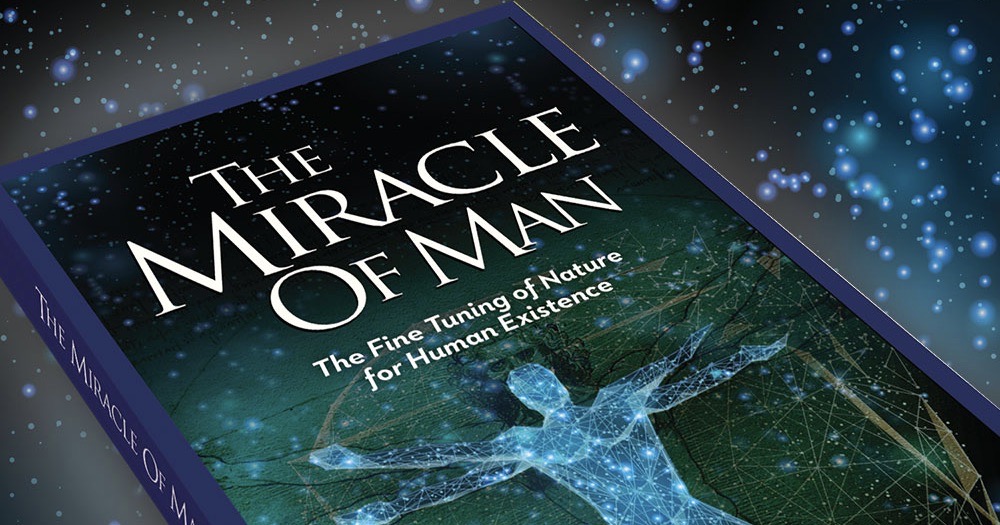 Human Origins
Human Origins
 Physics, Earth & Space
Physics, Earth & Space
The Miracle of Man: New Book by Michael Denton

“The wheel has turned,” writes biologist Michael Denton in his new book, out today, The Miracle of Man. A widening divorce that originated in the 16th century between our understanding of man and of the cosmos has been healed by discoveries in modern science. That is, if we’re willing to recognize it.
From the heliocentric revolution of Nicolaus Copernicus in 1543, to Darwin’s Origin of Species in 1859, science demoted man further and further, to the status of an afterthought in the cosmic scheme. Or not even an “afterthought.” As it seemed, neither life nor the universe gave evidence of a thinking designer. Rather than reflecting cosmic purpose, man was evidently of no consequence. This thought had profound consequences for Western culture. In 1901, with the science of his day in mind, Nietzsche could write that “nihilism stands at the door.” That, however, was about to change.
Downfall and Recovery
In 1911 and 1913, two pivotal years, there appeared books by Alfred Russell Wallace (co-discoverer of evolution by natural selection) and Harvard chemist Lawrence Henderson. In their work, the extraordinary fine-tuning of chemistry and physics was starting to come into focus. As it advanced, science delivered the news that from the outset of physical existence, at the Big Bang, the universe had planned for a miracle. And the miracle came. It was the rise of our human species in the Pleistocene epoch, proceeding from the use of stone tools to fire to metalworking, giving us, ultimately, our modern world.
For this, a vast suite of chemical and physical parameters were precisely set. These parameters are “uniquely fit” for creatures like ourselves, as Denton shows:
[O]ur existence as energy-demanding active air-breathing terrestrial organisms critically depends on a wildly improbable ensemble of natural environmental fitness comprising various chemical and physical laws as well as the properties of specific molecules such as oxygen and CO2 and specific elements such as the transition metals, properties that must be almost exactly as they are.
The cosmic and planetary environments, in other words — the hydrological cycle, the atmosphere, water, oxygen, and more — were designed with us in mind — our breathing, circulation, vision, muscles, nerves, brain, bones, and much else.
“A Primal Blueprint”
Both lyrical and soberly detailed, Denton writes,
The exquisitely fine-tuned ensembles of environmental fitness described here, each enabling a vital aspect of our physiological design, amount to nothing less than a primal blueprint for our being, written into the fabric of reality since the moment of creation, providing compelling evidence that we do indeed, after all, occupy a central place in the great cosmic drama of being.
This is the miracle of man. We are not positioned in the spatial center of the universe as was believed before Copernicus, but what we have found over the past two centuries confirms the deep intuition of the medieval Christian scholars who believed that “in the cognition of nature in all her depths, man finds himself.”
The Miracle of Man takes a story of downfall and recovery full circle. And it does so in a fascinatingly similar way to the story told by Denton’s Discovery Institute colleague, philosopher of science Stephen Meyer, in his recent book Return of the God Hypothesis. The evidences discussed by Denton and by Meyer are quite different. But they point to the same conclusion. This is so much so that Denton’s book could accurately, but not mellifluously, have been titled Return of the Anthropocentric Hypothesis.
True but Trivial
Of course, there’s a ready objection. Since humans find ourselves in existence, we must be fit for our environment. This is obviously true, says Denton. But it’s “trivial.” The remarkable observation is just how precisely the environment was specified for us. That is not trivial at all. It is a mark of supreme privilege.
From Denton’s superb presentation, other conclusions follow. For one, if the universe harbors intelligent extraterrestrials, they will not be “aliens” to us. Instead, because of the cosmic design, they will “strongly resemble Homo sapiens.” Their planet, or planets, will resemble our own, for the same reason. If they find a way to visit us, as UFO believers say, they will feel that they have come home.
The book culminates the series of works in Dr. Denton’s Privileged Species series. And it arrives, I have to add, in a strangely providential manner. In the United States, sputtering nihilists and screaming anarchists have turned their rage on the idea that someone, somewhere, could be thinking that the unborn man or woman is a miracle worth protecting. This is a consequential book — and, as the editors could not have predicted, a timely one.
